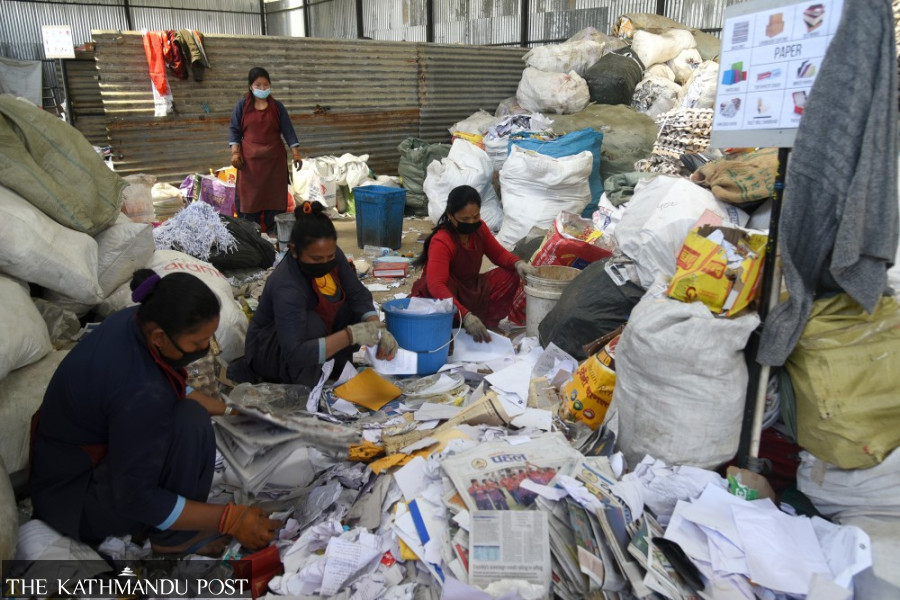Kathmandu
Construction of waste transfer stations stuck in bureaucratic deadlock
At the heart of the dispute is the appointment of a chief administrative officer, which has halted projects and left thousands of KMC employees unpaid.
Post Report
The planned construction of six waste transfer stations in the Kathmandu Metropolitan City has been put on hold indefinitely as a dispute between the city office and the federal government over the appointment of a chief administrative officer drags on.
The metropolis has been without a chief administrative officer since Saroj Guragain went on leave in the last week of December.
“Unless the government appoints a new Chief Administrative Officer to the metropolis, construction of the planned waste transfer stations cannot proceed,” said Sarita Rai, chief of the Environment Department at the city office. “By now, construction work would have been completed and the stations handed over to private sector firms selected for waste collection.”
The department, which plans to assign private companies to collect household waste, has identified six additional sites for waste transfer stations. The 32 wards of the metropolis have been divided into seven blocks for waste collection. Six of the seven blocks are set to be managed by the private sector, which will segregate waste in the waste transfer stations.
Only degradable waste will be transferred to landfill sites, according to officials. The city office plans to charge Rs300 per household for a waste collection fee per month.
“We have also approved proposals from some organisations and are in the process of awarding tenders,” said Rai. “However, unless the federal government appoints a new chief administrative officer, the tender process won’t move ahead.”
Halt in the construction of waste transfer stations is among several works affected due to the prolonged rift between the federal government and the city office. Over 4,000 employees serving under various departments of the Kathmandu Metropolitan City have been deprived of their monthly salaries for the past three months.
Among them are over 1,700 teachers hired to teach the ‘Nepal Bhasa’ subject in schools under the metropolis’ jurisdiction, as well as municipal police, and cleaning staffers, among others.
Officials say that the dispute has hampered key development projects, and they are also uncertain how long it will take to resolve. They also said that regular tasks such as cleaning, greenery maintenance, heritage conservation, and solid waste management could be severely affected if staffers are deprived of salaries for an indefinite period.
“We have over 300 contract workers handling the city’s cleaning services who have not been paid for the last three months,” said Rai. “It will be difficult for us to ask them to continue working without pay.”
Officials say some staffers complain that they have been unable to pay their children’s school fees, while others are unable to pay their rent.
The KMC does not have a chief administrative officer since Guragain was placed on administrative leave on December 23 last year over his alleged involvement in irregularities when approving the design of the Kathmandu Tower.
The city office had accused Guragain of bypassing formal approval systems and due process while endorsing the construction plan for Kathmandu Tower at the Old Bus Park area and formed a probe panel to investigate his decisions.
Guragain had filed a written complaint with the Ministry of Federal Affairs and General Administration stating that Mayor Balendra Shah prevented him from working.
A few weeks ago, the ministry reassigned Guragain as the chief administrative officer of the KMC and instructed the city office to create an environment for him to resume work. The city office, however, has refused to reinstate him and instead requested that the ministry grant financial authority to the acting chief administrative officer.
Metropolis officials say the ongoing ego conflict between the federal government and Mayor Shah has deprived thousands of employees of their monthly salaries and disrupted essential services.
Mayor Shah had formed a committee led by Shankar Prasad Pandey, a former secretary of the Nepal government, to investigate Guragain’s decisions. He has yet to receive the committee’s report.




 13.12°C Kathmandu
13.12°C Kathmandu










